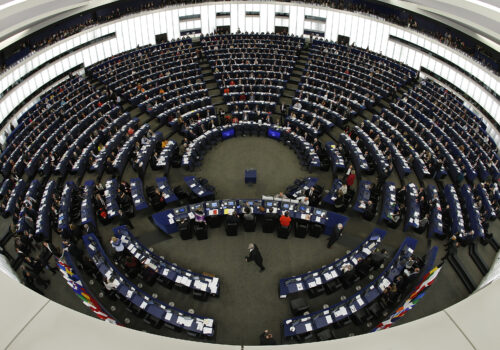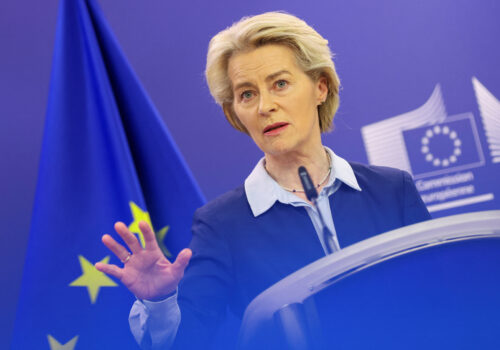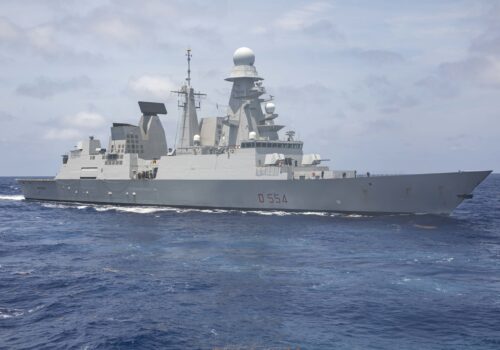Dispatch from Rome: Political stability gives Italy a chance to step into the spotlight
Historically, Italy’s political scene has been highly mercurial. But is it possible that politics in Rome is, dare it be said, boring now? Not exactly. Still, today’s political dynamics in Italy are not what international observers, or even Italians, may be used to. True, the country’s economic prospects remain weak, but Italy is living through a period of relative political stability under the government of Prime Minister Giorgia Meloni. This stability makes Italy well placed to push forward its foreign policy priorities and leadership.
Stability at home translates to leadership abroad
Across the political divide, the consensus in Rome is that Meloni’s position is secure. A year and a half into her tenure, Meloni maintains strong approval ratings. She faces no real threats from the opposition or her coalition partners. Would-be rivals of Meloni’s Brothers of Italy party, including Deputy Prime Minister and Infrastructure Minister Matteo Salvini and the League, have been outflanked. Forza Italia, led by Deputy Prime Minister and Foreign Minister Antonio Tajani, is on the rise, but it still lags in the polls. Both those in power and in opposition predict that Meloni will last for the remaining three years of the legislature—barring any twists, which even now no one can write off in Italy.
An important part of this stability comes from the fact that Meloni’s foreign policy priorities are largely supported among Italy’s policymakers and fit within transatlantic priorities. Initially feared as another weak link in the European Union (EU), Meloni has shown herself to be staunchly pro-Ukraine. She is a Euroskeptic but not anti-EU. And while US President Joe Biden differs from her on several notable domestic policies, he has found an ally in Meloni. “We have each other’s backs,” Biden declared during their March 1 meeting in Washington. It’s an interesting turn given that, shortly after her election, Biden used Meloni as a warning to Democrats. She has played a delicate balancing act on China, officially leaving the Belt and Road Initiative—Italy being the only Group of Seven (G7) country to have signed on—while still maintaining economic ties with Beijing. If anything, Meloni’s domestic opposition criticizes her for a lack of follow-through, especially on Italy’s aid to Ukraine and the funds pledged for development projects in North Africa.
Uncontested leadership and support for its foreign policy priorities allow Italy’s government to be much more impactful abroad. This stability comes at an opportune time. Italy holds the G7 presidency in 2024 and for that reason is in the driver’s seat when it comes to advancing the vision of the “steering committee for the world’s most advanced democracies,” as described by US Secretary of State Antony Blinken. Stability and popularity also allow Rome to make its priorities for the West heard, most notably the security of the Mediterranean and Western outreach to Africa.
Recentering the Mediterranean
Since Russia’s full-scale invasion of Ukraine, and arguably before, much of the West’s attention has focused on Europe’s eastern flank—and with good reason. As a result, Rome’s focus on the Mediterranean can at times seem like a regional preoccupation, but the case for the area’s importance for the transatlantic alliance is strong.
The Mediterranean is NATO’s southern flank, and a rather weak one at that. Italian policymakers do not see Russia as just threatening NATO’s eastern flank. Russia has long played a destabilizing role in Libya, for example, funneling weapons into the country as well as deploying its own forces. This destabilizing activity directly affects Europe, impacting migration flows and propping up an important presence off Italy’s coast. Italy’s leadership in the EU’s naval Operation Aspides in the Red Sea provides a useful example of the role Italy can play in organizing its European counterparts, and Rome should seek to extend that leadership to provide greater security in the Mediterranean in the face of threats from Russia and other actors.
The Mediterranean region is also poised to play an important role in the planned India-Middle East-Europe Economic Corridor (IMEC). A major deliverable of the 2023 Group of Twenty (G20) Summit in New Delhi, this rail-and-sea infrastructure network has huge potential for countries such as India and for Italy and the Mediterranean region to be a conduit that deepens Europe’s ties with emerging new global partners. Europe could provide these partners with an alternative to deepening economic ties with China and boost sustainable infrastructure investments across the network. Italy is well positioned to carry forward this effort. But it needs to make sure this massive project stays viable and on the West’s agenda. Italy should use its current G7 presidency to garner greater Western support for IMEC, and position itself as a key partner on the European link of the corridor.
The infrastructure development race to the top
Italy’s focus on infrastructure goes beyond IMEC. Rome is paying greater attention to infrastructure development across the Global South and stands ready to build on earlier efforts by the West. In June 2022, the G7 adopted the Partnership for Global Infrastructure Investment (PGII) to facilitate six hundred billion dollars in infrastructure projects by 2027. The EU’s Global Gateway promises to provide three hundred billion dollars for EU-supported projects, also by 2027.
Meloni, too, has jumped into the infrastructure development space. She has made infrastructure a cornerstone of her foreign policy and of Italy’s relationship with Africa through the Mattei Plan for North Africa, unveiled in January 2024.
Rome’s Mattei Plan has several drivers that fit in with the West’s larger infrastructure push. First, the plan aims to help African countries build stability at home to limit migration abroad. Meloni explicitly stated this goal, as Italy remains a key port of entry from North Africa. Second, the plan is intended to position Italy as a European energy hub, deepening the economic link between Europe and Africa. Third, the plan fits within the G7’s larger effort to prove the West’s rules-based system is fit for purpose and to offset the influence of China through a truly nonexploitative partnership framework. Fourth, mineral-rich states in Africa will be critical to the twin green and digital transitions. The extraction and processing of these resources must be supported with sustainable practices that respect the rule of law and labor standards, and help countries move up the global value chain. Doing so will help in the West’s de-risking efforts to shift away from overreliance on China while boosting states’ long-term development.
Building relationships that are not extractive or exploitive will be key to ensuring long-term partnerships, and Italy has said it intends to take this approach with future infrastructure development. Creating public-private partnerships will also be important, since the private sector will play an integral role in the financing of said investments. But the private sector needs to be convinced that investing doesn’t come along with an unacceptable amount of risk. There is a role for the government to play in minimizing these risks, and focusing on the opportunities presented by these markets.
Italy is well suited to set up the mechanisms needed to coordinate these projects. With its G7 presidency, Italy should focus on deepening the coordination of projects such as the PGII, Global Gateway, and the Mattei Plan. The Mattei Plan specifically will require greater effort to be successful. While the plan’s framework presents a possible blueprint for increased European and G7 engagement with the Global South, in its current form it is humble both in the number of projects and the amount of financing proposed—just over five billion euros for nine projects—compared to the PGII and Global Gateway. For this project to really take off, Rome will need to find more money to invest through the Mattei Plan and expand its scope, while fully integrating it into larger investment plans.
Until recently, political chaos and economic woes have caused Italy, the EU’s third-largest economy and a G7 member, to punch below its weight. The current political calm won’t last forever, but in this period of steadiness at home, Rome can expand its leadership role abroad.
Jörn Fleck is the senior director of the Atlantic Council’s Europe Center.
Rachel Rizzo is a nonresident senior fellow with the Atlantic Council’s Europe Center.
James Batchik is an associate director at the Atlantic Council’s Europe Center.
Nicholas O’Connell is the deputy director for public sector partnerships at the Atlantic Council.
Further reading
Mon, Apr 15, 2024
Your primer on the European Parliament elections and how they will shape the EU
Eye on Europe's elections By
As Europe heads to the polls to elect the 10th European Parliament this June, the Europe Center is breaking down the key people and issues to know.
Sun, Apr 7, 2024
Ursula von der Leyen set Europe’s ‘de-risking’ in motion. What’s the status one year later?
New Atlanticist By Jörn Fleck, Josh Lipsky, David O. Shullman
The European Commission president presented a new economic vision for the European Union’s relationship with China in March 2023.
Thu, Mar 7, 2024
With Operation Aspides, Europe is charting its own course in and around the Red Sea
New Atlanticist By
The main distinction with the US-UK approach is that the EU operation does not envision any participation in strikes against the Houthis.
Image: The Minister of the Interior Matteo Piantedosi, the Prime Minister Giorgia Meloni and the Minister of Foreign Affairs Antonio Tajani during the Prime Minister's Communications in view of the European Council on 21 and 22 March 2024, in the Senate Hall. Rome (Italy), March 19th, 2024 (Photo by Massimo Di Vita/Mondadori Portfolio/Sipa USA)


